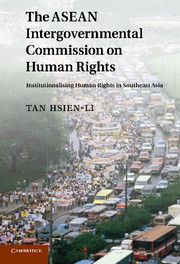 The ASEAN Intergovernmental Commission on Human Rights
The ASEAN Intergovernmental Commission on Human Rights Book contents
- Frontmatter
- Contents
- List of tables
- Preface
- 1 Charting the human rights institutionalisation process in Southeast Asia
- 2 Enough of ‘Asian values’: roots of the ASEAN states' reticence towards human rights
- 3 Self-determination and democracy: the human rights experiences of five ASEAN states
- 4 Instituting the regional rights regime: the ASEAN Intergovernmental Commission on Human Rights (AICHR) and the role of civil society
- 5 Human rights understanding between the ASEAN region and the United Nations: convergence, regional cohesion, and national responsibility
- 6 The unexplored aspect of human rights: what ASEAN needs to understand about the right to development
- 7 Sustaining AICHR's substantive empowerment: implementation, integration, and international law
- Bibliography and sources
- Index
3 - Self-determination and democracy: the human rights experiences of five ASEAN states
Published online by Cambridge University Press: 07 September 2011
- Frontmatter
- Contents
- List of tables
- Preface
- 1 Charting the human rights institutionalisation process in Southeast Asia
- 2 Enough of ‘Asian values’: roots of the ASEAN states' reticence towards human rights
- 3 Self-determination and democracy: the human rights experiences of five ASEAN states
- 4 Instituting the regional rights regime: the ASEAN Intergovernmental Commission on Human Rights (AICHR) and the role of civil society
- 5 Human rights understanding between the ASEAN region and the United Nations: convergence, regional cohesion, and national responsibility
- 6 The unexplored aspect of human rights: what ASEAN needs to understand about the right to development
- 7 Sustaining AICHR's substantive empowerment: implementation, integration, and international law
- Bibliography and sources
- Index
Summary
Introduction
Despite any latent misgivings Southeast Asia may have against international human rights, as seen in Chapter 2, we find that human rights have nevertheless made significant inroads into the regional consciousness. This is especially so if we scrutinise the internal structure of the states and recognise the long way they have come from their initial taste of human rights in the decolonisation process, which was subsequently stymied by authoritarian leadership. Of course, serious impediment to the institutionalisation of human rights still remains at both the domestic and regional levels. Endemic corruption, lack of resources and funding, poor civil infrastructure, and human resource training, together with low public awareness and lack of knowledge of how to use the human rights mechanism, are among the major obstacles to human rights empowerment. Nonetheless, there are positive signs that the states are taking human rights more seriously. This is not merely limited to their readiness to discuss the exact operational parameters of the Association of Southeast Asian Nations (ASEAN) Intergovernmental Commission on Human Rights (AICHR). Perhaps in an even more profound and substantive way, there is evidence that governments are slowly permitting the implicit and explicit application of human rights within the domestic sphere through bodies such as civil society organisations, national human rights institutions (NHRIs), and the courts.
Given that AICHR would severely lack strength unless coupled with a concomitant resolve to improve domestic human rights standards, this chapter will therefore analyse how the five Southeast Asian states of Indonesia, Malaysia, the Philippines, Singapore, and Thailand have dealt with human rights.
- Type
- Chapter
- Information
- The ASEAN Intergovernmental Commission on Human RightsInstitutionalising Human Rights in Southeast Asia, pp. 72 - 138Publisher: Cambridge University PressPrint publication year: 2011


